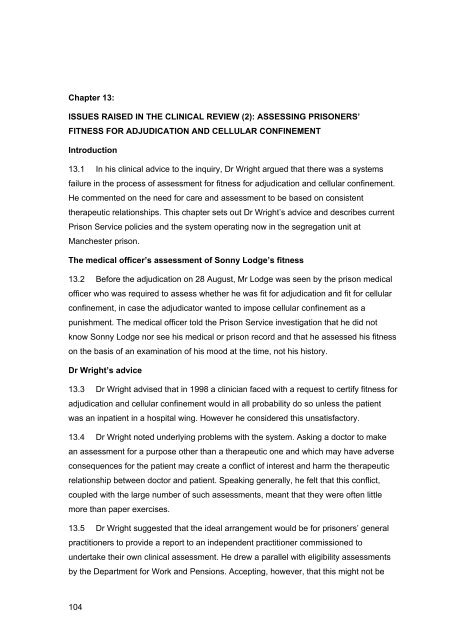Report of the Inquiry into the circumstances of the Death of Bernard ...
Report of the Inquiry into the circumstances of the Death of Bernard ...
Report of the Inquiry into the circumstances of the Death of Bernard ...
You also want an ePaper? Increase the reach of your titles
YUMPU automatically turns print PDFs into web optimized ePapers that Google loves.
Chapter 13:<br />
ISSUES RAISED IN THE CLINICAL REVIEW (2): ASSESSING PRISONERS’<br />
FITNESS FOR ADJUDICATION AND CELLULAR CONFINEMENT<br />
Introduction<br />
13.1 In his clinical advice to <strong>the</strong> inquiry, Dr Wright argued that <strong>the</strong>re was a systems<br />
failure in <strong>the</strong> process <strong>of</strong> assessment for fitness for adjudication and cellular confinement.<br />
He commented on <strong>the</strong> need for care and assessment to be based on consistent<br />
<strong>the</strong>rapeutic relationships. This chapter sets out Dr Wright’s advice and describes current<br />
Prison Service policies and <strong>the</strong> system operating now in <strong>the</strong> segregation unit at<br />
Manchester prison.<br />
The medical <strong>of</strong>ficer’s assessment <strong>of</strong> Sonny Lodge’s fitness<br />
13.2 Before <strong>the</strong> adjudication on 28 August, Mr Lodge was seen by <strong>the</strong> prison medical<br />
<strong>of</strong>ficer who was required to assess whe<strong>the</strong>r he was fit for adjudication and fit for cellular<br />
confinement, in case <strong>the</strong> adjudicator wanted to impose cellular confinement as a<br />
punishment. The medical <strong>of</strong>ficer told <strong>the</strong> Prison Service investigation that he did not<br />
know Sonny Lodge nor see his medical or prison record and that he assessed his fitness<br />
on <strong>the</strong> basis <strong>of</strong> an examination <strong>of</strong> his mood at <strong>the</strong> time, not his history.<br />
Dr Wright’s advice<br />
13.3 Dr Wright advised that in 1998 a clinician faced with a request to certify fitness for<br />
adjudication and cellular confinement would in all probability do so unless <strong>the</strong> patient<br />
was an inpatient in a hospital wing. However he considered this unsatisfactory.<br />
13.4 Dr Wright noted underlying problems with <strong>the</strong> system. Asking a doctor to make<br />
an assessment for a purpose o<strong>the</strong>r than a <strong>the</strong>rapeutic one and which may have adverse<br />
consequences for <strong>the</strong> patient may create a conflict <strong>of</strong> interest and harm <strong>the</strong> <strong>the</strong>rapeutic<br />
relationship between doctor and patient. Speaking generally, he felt that this conflict,<br />
coupled with <strong>the</strong> large number <strong>of</strong> such assessments, meant that <strong>the</strong>y were <strong>of</strong>ten little<br />
more than paper exercises.<br />
13.5 Dr Wright suggested that <strong>the</strong> ideal arrangement would be for prisoners’ general<br />
practitioners to provide a report to an independent practitioner commissioned to<br />
undertake <strong>the</strong>ir own clinical assessment. He drew a parallel with eligibility assessments<br />
by <strong>the</strong> Department for Work and Pensions. Accepting, however, that this might not be<br />
104
















